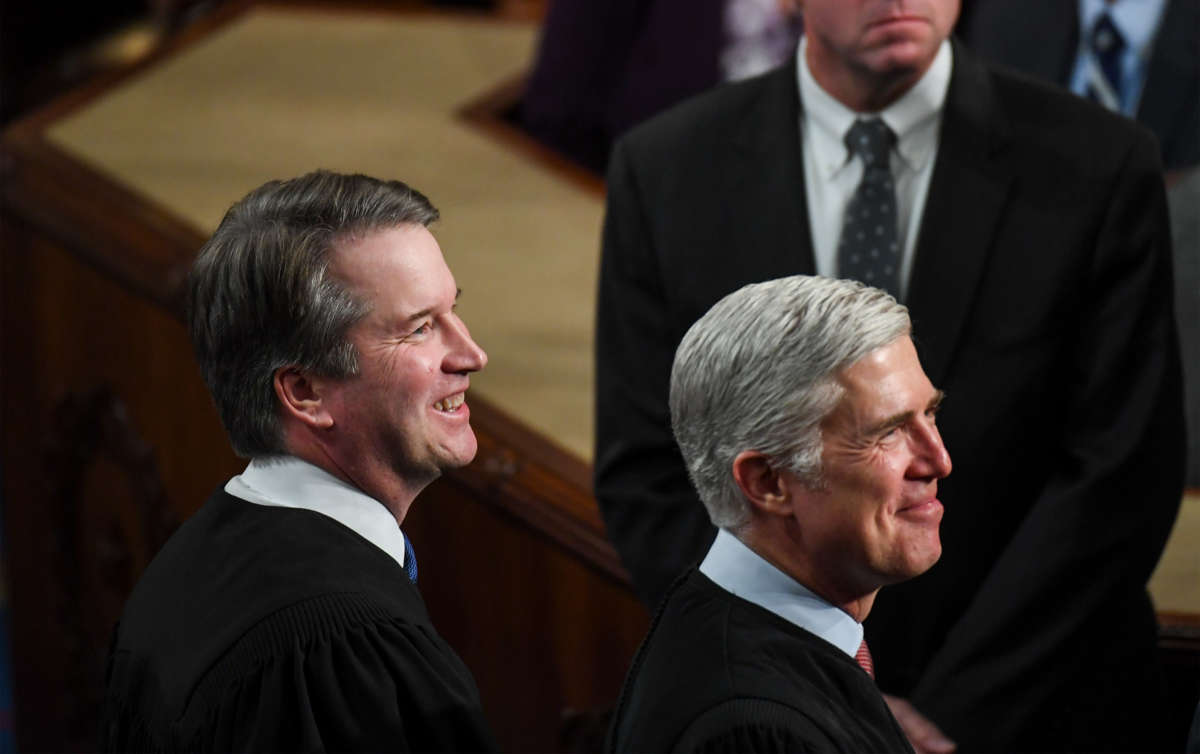The U.S. Supreme Court’s conservative majority Monday night was accused of green-lighting “one of the most brazen acts of voter suppression in modern times” after the body overturned a lower court ruling that extended the absentee voting deadline in Wisconsin by six days in an effort to allow people to more safely exercise the franchise amid the coronavirus pandemic.
In a 5-4 decision (pdf) along party lines, the high court ruled that Wisconsin voters must hand-deliver their absentee ballots by the end of the day Tuesday or have them postmarked April 7 if their ballot is to be counted. The decision rewards Wisconsin Republicans and GOP groups that led the legal challenge against the extension of absentee voting until April 13.
Matthew DeFour, state politics editor at the Wisconsin State Journal, noted on Twitter following the ruling that “there is no postmark requirement in state law.”
“The lower court judge changed the date, but did not add a postmark,” DeFour said. “The U.S. Supreme Court has just written a new election law in Wisconsin.”
In an unsigned opinion, the Supreme Court’s conservative majority attempted to wash its hands of any responsibility for intensifying an ongoing public health crisis by refusing to allow Wisconsin to extend absentee voting.
“The court’s decision on the narrow question before the court should not be viewed as expressing an opinion on the broader question of whether to hold the election, or whether other reforms or modifications in election procedures in light of COVID-19 are appropriate,” the opinion stated.
Justice Ruth Bader Ginsburg warned in a scathing dissent that the conservative majority’s ruling “will result in massive disenfranchisement”:
Because gathering at the polling place now poses dire health risks, an unprecedented number of Wisconsin voters — at the encouragement of public officials — have turned to voting absentee. About one million more voters have requested absentee ballots in this election than in 2016. Accommodating the surge of absentee ballot requests has heavily burdened election officials, resulting in a severe backlog of ballots requested but not promptly mailed to voters.
Slate’s Mark Joseph Stern wrote late Monday that the high court’s ruling “will nullify the votes of citizens who mailed in their ballots late — not because they forgot, but because they did not receive ballots until after Election Day due to the coronavirus pandemic.”
“Because voters are rightfully afraid of COVID-19, Wisconsin has been caught off guard by a surge in requests for absentee ballots,” Stern wrote. “Election officials simply do not have time, resources, or staff to process all those requests. As a result, a large number of voters — at least tens of thousands — won’t get their ballot until after Election Day.”
Let me be very clear about this. Tens of thousands of Wisconsinites will not receive their absentee ballots by Election Day BECAUSE OF THE PANDEMIC, THOUGH NO FAULT OF THEIR OWN.
The U.S. Supreme Court's five conservatives just said: "Too bad. You don't get to vote."
— Mark Joseph Stern (@mjs_DC) April 6, 2020
An election that forces voters to choose between protecting their health and casting a ballot is not a free and fair election. Nor should its results be treated as indisputably legitimate. This is a tragic day for democracy.
My piece: https://t.co/IlXfzkx0Bu @Slate
— Mark Joseph Stern (@mjs_DC) April 7, 2020
Shauntay Nelson, Wisconsin state director of advocacy group All Voting Is Local, said the Supreme Court’s decision “defies common sense and threatens to disenfranchise hundreds of thousands of Wisconsin voters.”
“Voters deserve free and fair elections where every voice is heard and the assurance that their health and safety will be protected while our democracy remains intact,” said Nelson. “It’s shameful that Republicans have used this crisis to their political benefit, silencing voters so they can remain in power. The result has been confusion, chaos and uncertainty for voters, all amid a global health emergency. This is no way to run a democracy.”
The Supreme Court’s ruling came just after the Wisconsin state Supreme Court overturned an executive order by Gov. Tony Evers and decided that Tuesday’s elections — which include the Democratic presidential primary and nearly 4,000 down-ballot contests — must proceed as scheduled despite the dire public health threat posed by COVID-19.
Kristen Clarke, president and executive director of Lawyers’ Committee for Civil Rights Under Law, said in a statement that the U.S. Supreme Court’s decision “raises grave concerns” that the right-wing body is “poised to unnecessarily interject itself in voting rights battles this presidential election season.”
“Contrary to the majority opinion’s claims,” said Clarke, “this case involved more than a ‘minor, technical’ question and will likely result in the disenfranchisement of hundreds of thousands of voters as 500,000 absentee ballots have not been returned as of Monday night.”
Angry, shocked, overwhelmed? Take action: Support independent media.
We’ve borne witness to a chaotic first few months in Trump’s presidency.
Over the last months, each executive order has delivered shock and bewilderment — a core part of a strategy to make the right-wing turn feel inevitable and overwhelming. But, as organizer Sandra Avalos implored us to remember in Truthout last November, “Together, we are more powerful than Trump.”
Indeed, the Trump administration is pushing through executive orders, but — as we’ve reported at Truthout — many are in legal limbo and face court challenges from unions and civil rights groups. Efforts to quash anti-racist teaching and DEI programs are stalled by education faculty, staff, and students refusing to comply. And communities across the country are coming together to raise the alarm on ICE raids, inform neighbors of their civil rights, and protect each other in moving shows of solidarity.
It will be a long fight ahead. And as nonprofit movement media, Truthout plans to be there documenting and uplifting resistance.
As we undertake this life-sustaining work, we appeal for your support. Please, if you find value in what we do, join our community of sustainers by making a monthly or one-time gift.
